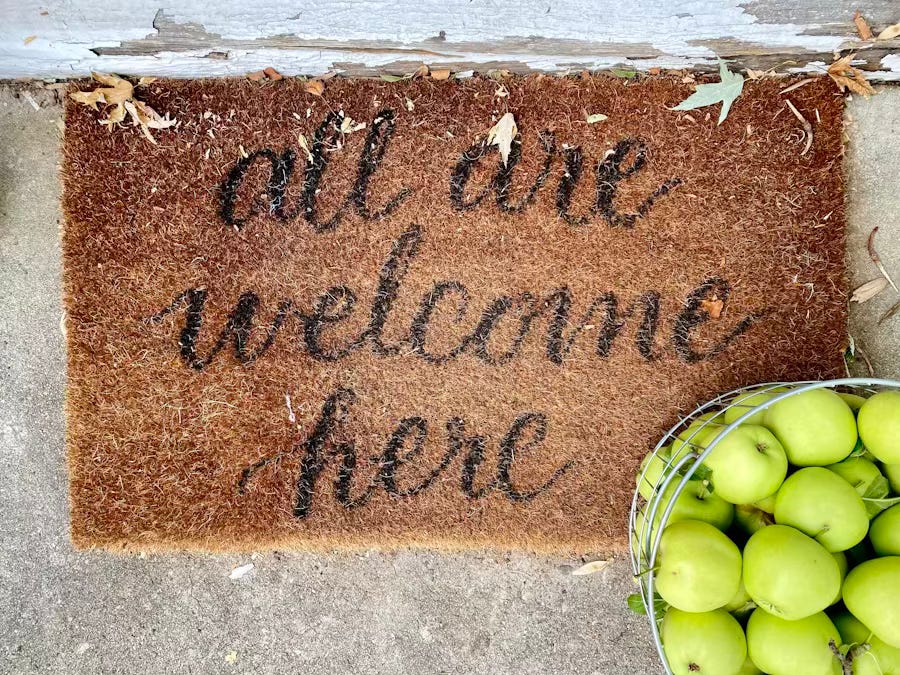
Acceptance is not necessarily welcome. There is often a big gulf between the two. I have been reflecting on the difference a lot over the last couple of weeks since I wrote my post Blessed Are the Vulnerable in which I talked about my husband’s deteriorating memory and the need to welcome this stranger into our marriage and into our lives. One person responded “don’t you mean acceptance rather than welcome”.
Acceptance - the action of consenting to receive or undertake something offered - doesn’t always work and it doesn’t always mean a change of attitude or perspective. We have seen that over the last couple of months here in the U.S. as policies accepted for years but not really welcomed are dismantled and overturned.
Acceptance is easily disrupted by fear and uncertainty. In fact, acceptance, it seems to me can sometimes hide wounds and resentments that continue to fester below the surface. When we are afraid, we resent that which is different and or outside our comfort zone and sooner or later fear takes over, and like a volcano erupting, it can burst through the surface with a fiery display of violence and destruction.
Welcome on the other hand is an embracing of reality with a desire to gain understanding and move towards peace and reconciliation. It requires a change of perspective that goes far deeper than acceptance, requiring a recognition of the interconnectedness of all things and our need to welcome even those that we might otherwise regard as enemies. It tends to calm fear rather than inciting it.
Hospitality in ancient Palestine was more than a courtesy extended to friends and travellers. It was the means that villages used to determine if strangers were friends or enemies, a threat or an asset to the community. Extending hospitality by providing food, water and shelter was a way to temporarily adopt strangers into the community and hopefully convert a potential threat into a friendly alliance. Sometimes oil was poured over the head of the stranger as a sign of welcome.
It is probable that it was these customs that David referred to in Psalm 23:
You prepare a feast for me
in the presence of my enemies.
You honor me by anointing my head with oil.
My cup overflows with blessings. (Psalm 23:5)
In this verse David is most likely not talking about God preparing a banquet for us to eat while our enemies sit around with empty stomaches drooling over the lavish food we are enjoying. This is a verse that speaks of the ancient practice of hospitality, an invitation to sit down and enjoy a meal with strangers and those we perceive as a threat, an encouragement to seek for understanding and reconciliation rather than division and hatred.
What an important message for today. We don’t just need acceptance of others and an uneasy truce with them that is easily broken by fear. We need to extend welcome and embrace others, no matter what they look like or how they act, as potential friends. We live in a world of great division where there is much necessity for all of us to sit down over a meal with those we disagree with and see as a threat, not so that we can try to hit them over the head with our perspectives but so that we can listen and perhaps change ourselves.
As you think about this what comes to mind? What situations are you currently facing that might be defused by sitting around the table and sharing a meal? Where have you seen God prepare a feast that has brought enemies together and overcome fears and disagreements? How could you prepare a meal “in the presence of your enemies” and offer open hospitality to those you disagree with?
In Jesus’ day this kind of hospitality was considered more than a commandment. It was a sacred obligation, filled with the joy of serving both others and God. Those that did not extend hospitality to orphans, widows and the homeless could be rejected. Like early monastics and Celtic Christians, Jews believed that sometimes in welcoming strangers they welcomed angels into their midst.
Jesus repeatedly demonstrated his joy in offering hospitality as he fed the crowds, sat down with tax collectors and shared a passover meal with his disciples. In fact it was central to his ministry. Even after his death he came back to share meals as a way to communicate his message of salvation and hope.
As I thought about this today, the picture that came to me was of Jesus sitting and eating that last meal with Judas, a fitting image for us as we start to think about Holy Week. Then I saw him get down and wash Judas’s feet. He must have realized that Judas was about to betray him, but he still reached out in embrace not division. I wonder if he hoped that through this gracious act of hospitality towards him Judas would change his mind.

At communion our priest always says “All are welcome at the table” yet the welcome of God begins long before the institution of communion at the last supper. Radical hospitality is at the heart of God’s creation. Every time I go out into the garden and harvest the abundance of God’s provision, or walk through the neighborhood enjoying the beauty of God’s world I am aware of the radical hospitality of a God who comes to welcome us all home to the kingdom banquet.
Many feel surrounded by enemies in the current political climate. How do we respond in these hard times? This is not a time for complacency but for commitment, not for hate but for love, not to close doors but to open them, not for violence but for peace, not to wound but to heal, not to bring division but to inspire reconciliation.
There is no better place to learn to listen, not to the answers in our own heads but to the unsettling questions others are asking, than when sitting around the table sharing a meal. And there is no better time to take Jesus’ radical call to hospitality seriously and reach out with love not hate, seeking to build bridges not walls, to embrace compassion not conflict.
Lent provides a wonderful opportunity to think about the radical welcome of Jesus and the invitation to be like him. It provides time and space to listen to the voice of God more intently. It is in the place of listening that change can begin for all of us.
As we move through Lent towards Easter and your desire to be hospitable to friends and family, think about the people you disagree with, want to exclude or think are about to betray you. How could you reach out with radical hospitality to them in this season? Read through Psalm 23. What names come to mind? Perhaps it is an unwed mother like Mary, who could have been thrown out by her family. Or someone like the lepers Jesus healed, despised by the society around them yet welcomed by the son of God. Or the Roman soldier whose servant Jesus healed, foreigners like immigrants, refugees and those of other religions. What steps do you need to take in the last few weeks of Lent to reach out in a spirit of hospitality and reconciliation? How could you embrace the radical journey of Jesus’ hospitality.





I hear